Achieve more by reducing your priorities rather than adding to your pressures.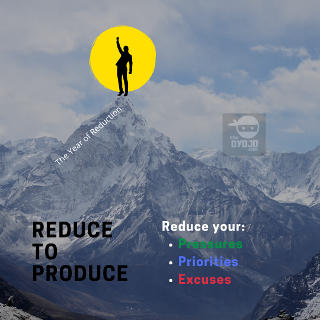 Whether it’s the beginning of the year or any date thereafter, the demands of life weigh heavy on those who maintain a hunger for personal and professional growth. Life often feels like a mountain we are ill equipped to summit. The path of the status quo leads to lofty goals set at the dawn of the new year, most of which quickly fade into the necropolis of to-do lists gone un-done. Though it seems counter intuitive, if you want to carry your goals over the peak, you should start by reducing the weight of your load. Prioritization helps you to embrace your identity and live your purpose. Reducing your load starts with weeding through the internal and external pressures to focus on what is important to you. When you harness this simple truth you realize it is better to have a few things that are completely done rather than several items that are only partially done. Going over the mountain starts with preparation and then taking those first steps up the mountain. Reduce in order to produce. “It is not a daily increase, but a daily decrease. Reduce your Pressures.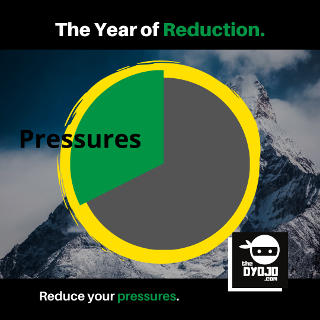 You should be intentional about giving yourself some credit from time to time. Remember, you have a purpose, a job, family, commitments, side hustles, hobbies and you need time to sleep. Take a moment to appreciate what you have accomplished and where you have traveled in your journey. It’s ok to give yourself a compliment. As you climb towards your goals, build into your development process time for reflection and gratitude. Bill Carmody, founder and CEO of Trepoint, encourages growth minded professionals, “So much of what we do in our business is driven (or limited) by our psychology. Celebrating your wins not only feels great physically, but it reinforces the behavior you want to show up when you face a new challenge or opportunity.” "Consider what you might accomplish if you stopped Reinforce positive behavior as you face challenges. This is enhanced by surrounding yourself with positive influences. This should not be confused for surrounding yourself with people who will tell you what you want to hear and will allow you to underperform on your potential. There is a fine line between those who will, “Tell you like it is,” but have no functional input to help you evolve and those who will encourage, as well as correct, as they walk alongside you. Resources such as social media can both be distracting from your efforts to reach your goals as well as create a false sense of achievement. Don’t fall prey to the allure of attention (external adulation) and achievement (internal satisfaction). Srinivas Rao challenges us to consider, “What you might accomplish if you stopped confusing attention with accomplishment.” Rather than sharing about what you plan to do in order to receive some fleeting praise, celebrate your victories (large and small) with those who are directly involved in your ascent. Build sustainable habits that will aid you in achieving your goals:
Reduce your Priorities.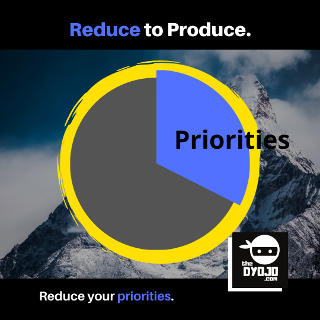 Climbing a mountain requires preparation, dedication and endurance. You have limited time and you have to be realistic with what you can pursue and invest in. Whittle down your priorities to the core things that matter to you. Your priorities will change as you unfold your personal and professional development. If everything is important then nothing is. Be intentional by reducing your list of priorities to items that you can gain momentum and achieve. Focus is the key to harnessing your ability to achieve. If you want to achieve your goals you must transfer your ideas (what is in your head) into habits (action) as this is the most effective way to develop sustained positive changes. Your neural messengers that facilitate goals being transformed into habit are called endocannabinoids. Dr. Ralph Ryback, writing for Psychology Today, states, “The best way to get your endocannabinoids to help you form a habit is by being consistent. Work toward your goal every day, even if you don’t feel like it. You can set aside a specific time each day, or a specific context.” "The mark of a great man is one who knows when to set aside the important Simple steps for crushing your growth goals:
Reduce your Excuses.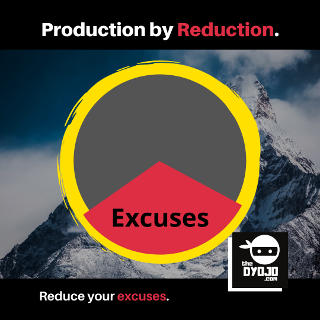 In a letter to his friends in Rome, Paul writes, “I say to everyone among you not to think of himself more highly than he ought to think, but to think with sober judgment.” Often, our minds receive this as though we need to bring ourselves down a notch with an improper understanding of humility. I find it interesting that the author says, “With sober judgement,” which also means an honest evaluation. We shouldn’t think of ourselves more highly than we ought but also we should not think of ourselves more lowly than we ought. Sober judgement means that we have an understanding of our identity and our purpose. You are capable. You can achieve what you want. Do you want to have a better body, you can do it - you will have to be realistic with what that commitment will require. You know the process includes eating better, getting sleep and a commitment to working out. Personal and professional development is not so much about learning new information but applying what we know to be true. Achieving a better body is often tied to looking like some prototype. When you compare yourself to others it isn’t helpful. Your goals should be specific to you and reaching your potential. Development is a process of embracing your identity and living your purpose. If you are in a rut, start yourself with some low hanging fruit that will help you get the wheels turning again. Your success will inspire you to reach further. It’s amazing how when you start saving a little money, the momentum of those feelings of small achievements propel you to save more and grow your vision for what is possible. The same is true in any endeavor of change. Development is a process of embracing your identity and living your purpose. Reduce your excuses to produce better results:
The Year of Reduction.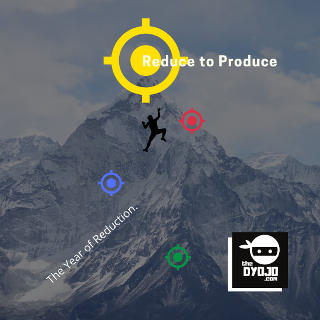 What would happen if you and I declare this The Year of Reduction - Reduce to Produce? So much of what screams at you and me for attention challenges us to do this or that and only adds to the weight we carry. By shedding some of the unnecessary weight you can focus on what matters to you and make progress in your process. Embrace your identity, be who you are. Live your purpose, be all that you were designed to be. What will you do today to reduce your pressures, reduce your priorities and reduce your excuses so that you can climb your mountain with less resistance? Resolve within yourself to Reduce so that you can Produce.
0 Comments
Build momentum toward reaching your goals by simplifying your vision process. How many times have you been asked, “Where do you see yourself in five years?” While it seems like a silly question when you are applying for an entry level job flipping burgers, or any job for that matter, it is one that can be helpful for your personal development. Where do you want to be in five years? Do you have a vision for your professional life trajectory? Hellen Keller was born both deaf and blind but refused to allow those major setbacks to define her. Her words and example are an inspiration as well as a kick in the butt when she says, “The only thing worse than being blind is having sight but no vision.” Start with what isn’t. If it isn’t enough that 2020 is trying to slap you in the face, you’ve just been called out by Hellen Keller. Before you despair, let us help you simplify your pursuit of a clear vision by ruling out those items that are not critical to being purpose driven. Having vision is not about seeing the future. You are not required to be a fortune teller or a practicing daytime television psychic in order to have vision for your future. We are enamored with the false idea that only the special can thrive. Do not buy into the concept that in order to be an effective leader you have to also be a seer of the unknown. Do you heap pressures upon yourself by believing it is your job to think about what will change in the coming year so that you can seize upon those opportunities? By contrast, Amazon CEO Jeff Bezos finds it helpful to ask, “What won’t change.” He knows that customers will always want lower prices, wider selection and faster delivery. These expectations are a constant. Jeff knows he will never have a customer come to him and say, "Jeff, I love Amazon; I just wish the prices were a little higher. I love Amazon; I just wish you'd deliver a little more slowly."
Change is a constant, adapt. While it serves purpose well to ask yourself, what won’t change as opposed to worrying about what will change, this does not mean that we aren’t required to adapt. Jack Welch is viewed by many as the key figure in General Electric’s reportedly 4,000% growth during his tenure as CEO from 1981-2001. He speaks often on the importance of leaders creating clarity in vision, structuring the processes around purpose and seeing things through to completion. Two decades of sustained growth, leading teams through transitions from the 80’s to the 90’s and then into the new century, makes for some unique perspectives on growth. Vision must be revisited regularly as the market evolves. As a leader you must lead yourself before you can lead your team as both you and the organization have to be prepared to adapt regularly. Even in a company as large as GE, Jack Welch understood the importance of continual growth, “If the rate of change on the outside exceeds the rate of change on the inside, the end is near.” Finding the means to clarify your vision in the midst of uncertainty is essential. Build upon a sense of purpose for yourself and help your team members to grasp theirs.
Eliminate the unsuccessful. We have bought into the belief that in order to be prosperous we need to emulate the habits of the uber successful. Author Darius Foroux talks about meeting a wealthy (aka “successful”) person for the first time. In sharing this, Darius counters the idea of copying the rich, as the entrepreneur told him, “I just try to avoid being unsuccessful. Study what makes you unsuccessful, unhappy, broke, fat, stupid. Then, eliminate those things out of your life.” Simple but never easy. Turn your sights towards reducing wasted energy and transfer that to productive outputs. It is important to establish your own purpose and to define your own goals. Your definition of success may be different from the next person, and it should be. If Jeff Bezos leads Amazon by asking, “What isn’t going to change,” you will also find value in asking yourself, “What have I been doing that is not bringing me closer to my vision and goals?” It takes time to develop broken thought patterns and bad habits, so it will also take time to create new routines. Recognizing the need to change is the first step in pursuing positive changes.
Simplify and make progress in the process. With so much information at our disposal, it is important to remember that mastering the basics and building from that foundation is still a solid course towards growth. Bruce Lee had some great comments in this regard, “It is not a daily increase, but a daily decrease. Hack away at the inessentials.” This imagery is excellent, we are in a fight to literally “hack away” those things which steal our focus and energy from gaining momentum in our pathway to success. You have limited time and energy, if you can direct those resources at useful endeavors you will win.
The key is to STOP doing what isn’t working. With these perspectives you can start to simplify the path towards conquering your growth goals. Author and coach, Lex Sisney, recaps an effective strategy for coaching your employees that is apropo to leading oneself—the Stop-Start-Ideal approach. Lex says, “If we can first get clear on what old behaviors or mindsets need to stop, and actually stop them, by law that frees up energy and capacity to develop new mindsets and behaviors. If we don’t first stop the old behaviors, the inertia of the status quo will continue.” We are all too familiar with the allure and the consequences of the status quo. 2020 is a great year to operate from a place of clarity as we make progress in the process. As you prepare to battle for your dreams, let Bruce Lee’s principles kick your goals into gear. The importance of prioritization The importance of prioritization Bruce Lee rose to icon status in the 1960’s for ushering in a new generation of interest to the martial arts. He is viewed as a person of laser focus who made “karate” cool through his movies. Behind his public persona was a quest to develop a martial arts system that elevated beyond the status quo of stale practices that did not reflect real world combat. Lee worked tirelessly to develop his brand of martial arts which he called Jeet Kun Do. You can imagine that someone like Bruce, who wanted to make the world better through his fighting system, had to prioritize his efforts. Balancing his Hollywood big screen projects such as Enter the Dragon, small screen appearances including the television show The Green Hornet, developing his system of fighting, instructing students and writing, among other things. His efforts made a lasting impact with regards to bridging the gaps and perceptions that separated the East from the West at that time. “The successful warrior is the average man, with laser-like focus.” - Bruce Lee Writing for Time magazine, Joel Stein noted, “With nothing but his hands, feet and a lot of attitude, he turned the little guy into a tough guy.” We know Bruce Lee for what he became, but in 1959 he was an 18 year old Asian kid who traveled from Hong Kong to the United States. Lee was not a likely fit for a future pop culture icon but his drive led him into the limelight. Bruce took the world by storm and his fame was only shortened only by his untimely death at the age of 32. Stein elaborates on the impact that Mr. Lee made in a broader social context, “He was the redeemer, not only for the Chinese but for all the geeks and dorks and pimpled teenage masses that washed up at the theaters to see his action movies. He was David, with spin-kicks and flying leaps more captivating than any slingshot.” Bruce approached martial arts with the thoughtfulness of a philosopher. He was intentional in his actions and his intensity brought a brilliance to everything that he did. Lee expressed several key ideas that are helpful to personal and professional development. Our ability to reach our goals has a lot to do with how well we prioritize our efforts. Rabid Practicality “Knowing is not enough, we must apply. Willing is not enough, we must do.” - Bruce Lee Lee wanted Jeet Kun Do to incorporate, “Practicality, flexibility, speed, and efficiency.” Personal development is a paradox. To achieve we must be practical as well as rabidly ambitious. This is best expressed as being led by vision. You should have Big Hairy Audacious Goals (BHAG) but to achieve you must break those down into 10 year, 3 year, 1 year, quarterly, monthly and daily goals. Build your confidence by breaking your dreams into goals and get to work. Veracious Hunger “Absorb what is useful, discard what is useless and add what is specifically your own.” - Bruce Lee Bruce was well-read and had an extensive library dominated by martial arts subjects and philosophical texts. Your professional development must be applicable to your vision, this does not mean that you can only study what others in your industry produce. Lee learned from disciplines as broad as fencing and boxing to develop his art. Learn to discern between what is helpful and what is not. Keep making progress in your process. Aggressive Reduction “It is not a daily increase, but a daily decrease. Hack away at the inessentials.” - Bruce Lee How often do you have multiple tabs open or too much clutter in your work space? When we realize it is better to have a few things that are completely done than several things that are only partially done, we start to win the battle of prioritization. Author Stephen Covey frames it this way, The key is not to prioritize what's on your schedule, but to schedule your priorities.” Start your day with a plan and work your plan rather than just winging it. Live your life with intentionality. Unrelenting Belief “Life’s battles don’t always go to the stronger or faster man. But sooner or later the man who wins, is the man who thinks he can.” - Bruce Lee In her book Unqualified Success, author Rachel Stewart shares personal and practical tips for bridging the gap from where you are today to where you want to be. What is unique about her book is that she walks the reader through portions of her own professional development where she felt unqualified. Rachel came to realize that we all start out unqualified which should be motivating rather than deflating. Cleaning out your thought closet and taking ownership of your thoughts are keys to unlocking your potential. Your dreams should fear you Whether your goal is to build something new as an entrepreneur or to improve your organization’s performance as a manager, start by leading yourself. Time is limited so make sure you are using it effectively. Open a can of intentionality by prioritizing your efforts and resources towards making progress on your goals. There are no short-cuts or secret sauce. Every dreamer can be an achiever. Open a can of motivation by remembering this encouragement from Bruce Lee, “The successful warrior is the average man, with laser-like focus.” Additional Resources:
An overview for some of the pathways to a good career that don’t require a college degree to get started. Can I find a good job without a degree? Can I find a good job without a degree? Most professionals didn’t know what they wanted to do right away. The majority of those who did go to college are working in a field that is outside of their college major. This doesn’t means that college has no value but the idea that going to college will guarantee success is a false one. Conversely, not attending college does not mean that you are a going to be failure. If you want to pursue a good career but aren’t sure if college is the path for you, there are options. Questions you might be asking if you are unsure about college.
Help finding a job without a college degree.A college degree may make your resume more presentable and possibly give you an upper hand on other applicants but it does not guarantee employment. If you don’t know what to do, why not find an entry level position for a job in a field that peaks your interest? You can provide for yourself while you are figuring things out and you may find something you enjoy. Service based industries such as retail, food and construction are always hiring. You may get rejected or you may get hired. If you get rejected ask them what you would need to do in order to make yourself a more appealing applicant. Continue to seek out opportunities in fields that interest you. Keys to dealing with employment rejection:
Explore career pathways through the skilled trades. Skilled trades are eagerly looking for candidates. Skilled trades are eagerly looking for candidates. In the not so distant past, it was common for young people to enter into an apprenticeship program as a career pathway. In the simplest terms, apprenticeship means you are learning from someone who has experience in a skilled trade so that you can learn that trade and thereby earn a living doing the same. In most areas the formalized apprenticeships are offered through labor unions for work including electrical, plumbing, automotive, mechanical and construction. Companies in the construction industry that provide services including: property restoration, remodeling, asbestos abatement, landscaping, roofing, painting, HVAC and so forth are eagerly looking for applicants who are trainable. If you can bring the character traits of being honest, hard working and willing to learn you will find that there are opportunities to build an enduring career for yourself. Find your local community college career center.There are so many resources out there for people looking for employment. A simple search of “employment resources”, “career assistance” and/or “job opportunities” with your area will pull up options for local help. Your local community college will have resources for community members, even if you are not a student, such as these from Pierce College in Puyallup, Washington:
Learn to succeed by attending a trade school.What is a trade school? According to The Simple Dollar, “A trade school, also known as a technical or vocational school, is an educational institution that exists to teach skills related to a specific job.” Attending a trade school can provide specific training in a field that often can lead more directly into immediate work opportunities. Trade schools often are less expensive and require less time to complete. There are trade schools for various industries including animal science, business, legal, medical, technology and skilled trades. Reach out to a temporary employment agency.If you need to work but aren’t sure what you want to do, applying with a staffing agency is a good way to find short term assignments that allow you to try multiple jobs. Temporary labor is utilized by various industries to fill needs during their busy seasons, seasonal work and to fill needs within their organization. Some staffing companies, such as Staffing Partners in Eugene, Oregon, will even provide assistance with basic skills and training to help prepare you for success with a local company.
Seek out local, county and statewide employment assistance.There are agencies in your city, county and state that are set up to help you succeed in your employment search. In Washington state Monster.com, a popular job search website, has partnered with state, local and nonprofit agencies to provide training and employment help. This outlet is titled WorkSource offering, “Job seekers access to thousands of jobs and advanced job-search tools to find career opportunities more easily.” Pursue job skills help from the federal government.Another option includes programs funded at the federal level such as Job Corps. These programs offer hands-on training in growing industries. While Job Corps targets persons between the ages of 16 and 24, the requirements beyond that are rather broad. Eligibility includes a commitment to improving your future and the need for job skills training to get you started on your career pathway. Programs like these often do not cost the participants anything and can provide those that complete them with skills as well as a clear pathway to gainful employment. There are many paths to success, intentionally develop yours.There are many ways to make mistakes. As long as your mistakes do not include violating laws, ethics or human decency, most of these errors will not permanently hinder your life path. You can choose to learn from your own mistakes or you can be wise and learn from the mistakes of others. The important thing is to learn so that your mistakes are not wasted. Similarly, there are many ways to achieve success. The important thing is to try to chart a vision for where you are headed and what you want to be. This is a lifelong pursuit and will evolve as you develop personally as well as professionally. There are so many opportunities out there. The first step is the most important, move forward and keep going.
|
AuthorThoughts on personal and professional development. Jon Isaacson, The Intentional Restorer, is a contractor, author, and host of The DYOJO Podcast. The goal of The DYOJO is to help growth-minded restoration professionals shorten their DANG learning curve for personal and professional development. You can watch The DYOJO Podcast on YouTube on Thursdays or listen on your favorite podcast platform.
Archives
March 2023
Categories
All
<script type="text/javascript" src="//downloads.mailchimp.com/js/signup-forms/popup/unique-methods/embed.js" data-dojo-config="usePlainJson: true, isDebug: false"></script><script type="text/javascript">window.dojoRequire(["mojo/signup-forms/Loader"], function(L) { L.start({"baseUrl":"mc.us5.list-manage.com","uuid":"b9016446bd3c6a9f0bd835d4e","lid":"83282ffb9e","uniqueMethods":true}) })</script>
|
Jon Isaacson |
Connect. Collaborate. Conquer.
© COPYRIGHT 2015. ALL RIGHTS RESERVED.
|

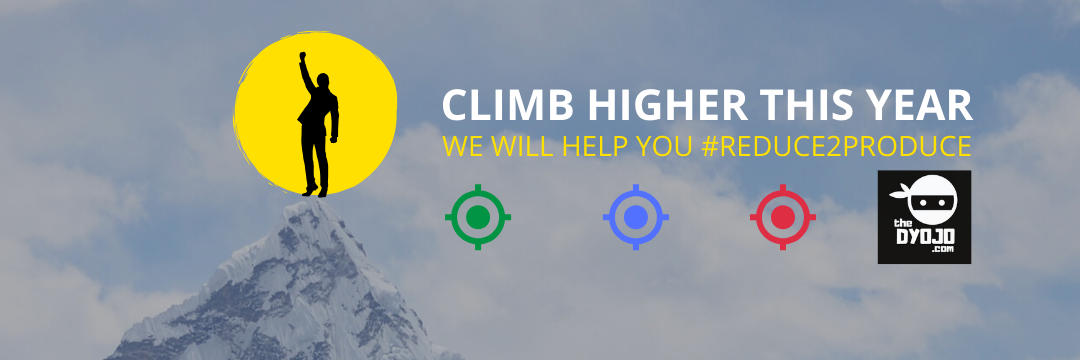



 RSS Feed
RSS Feed